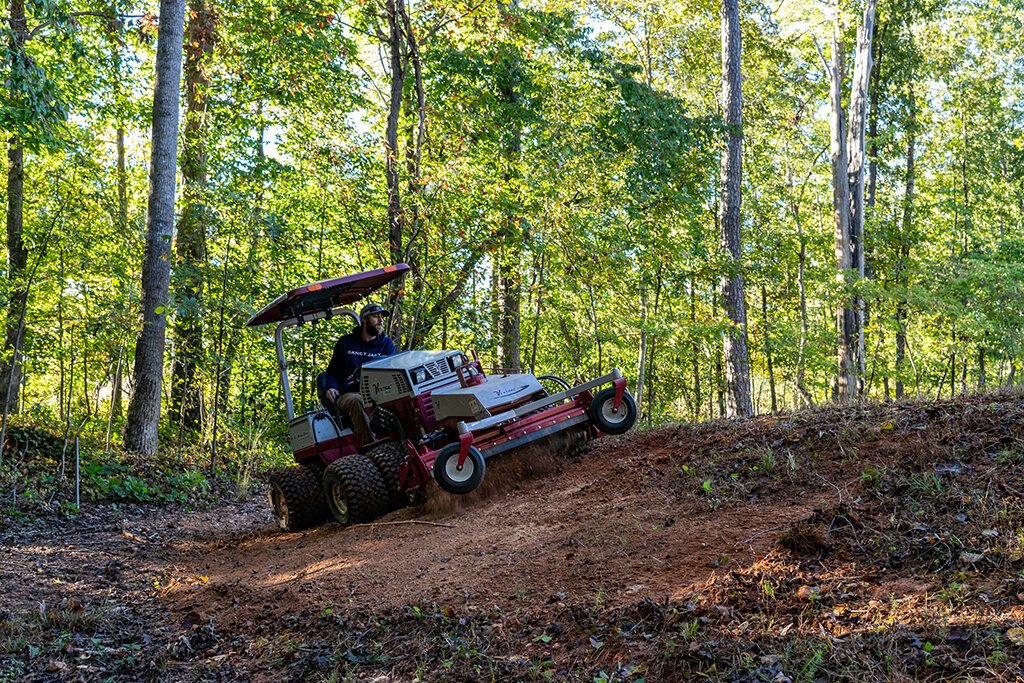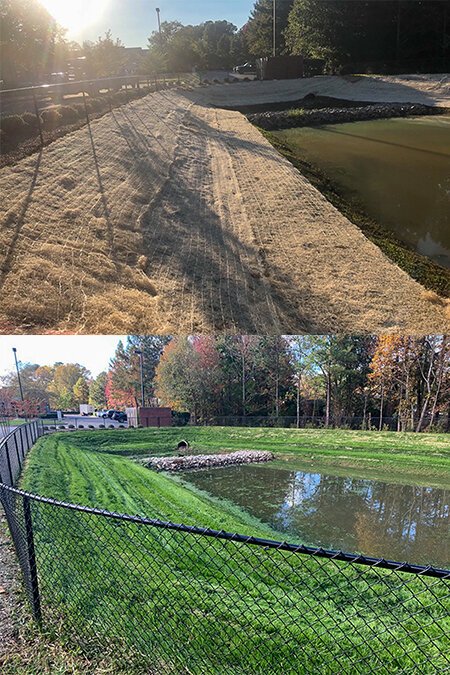Stormwater Turf Improvements & Repairs for Atlanta BMPs
Atlanta stormwater turf improvement and repair services from a specialized stormwater pond contractor is key to restoring BMP compliance. Inspection failures, increased maintenance costs, and sedimentation issues can be caused by lack of healthy, vegetated turf cover.
Lack of turf cover in and around Best Management Practices (BMPs) is a major cause for inspection failures in the Atlanta, Georgia area. Establishing healthy vegetated turf cover is crucial not only for passing inspections but also for the optimal performance of stormwater systems. In this blog, we’ll explore the importance of turf cover, the implications of insufficient coverage, and the effective remediation process to ensure compliance and functionality.
The Importance of Healthy Turf Cover for Atlanta BMPs
Healthy, vegetated turf cover around stormwater devices serves several key purposes:
Erosion Control: Dense turf prevents soil erosion by stabilizing the ground. This is essential in maintaining the integrity of the stormwater device and preventing sedimentation in water bodies
Water Quality Improvement: Turf acts as a natural filter, trapping pollutants and sediments before they enter the stormwater system, thus improving water quality
Aesthetic Value: Well-maintained turf enhances the visual appeal of the area, contributing to the overall value of the property
Regulatory Compliance: Local regulations often mandate adequate turf cover around stormwater devices to ensure proper functioning and environmental protection. Failure to meet these standards can result in fines and mandatory corrective actions
Stormwater Compliance and System Issues
The lack of proper turf coverage can lead to several compliance and system issues:
Inspection Failures: Atlanta area municipalities conduct regular inspections of stormwater devices. Bare or poorly vegetated areas are a common cause for failing these inspections, leading to fines and required remediation
Erosion and Sedimentation: Without sufficient turf, soil erosion increases, leading to sediment build-up in ponds and downstream water bodies. This not only reduces the capacity of stormwater devices but also impacts water quality
Increased Maintenance Costs: Poor turf cover often requires repeated interventions to stabilize and remediate the soil, leading to higher maintenance costs over time
Atlanta Stormwater Pond Turf Remediation Process
Effective remediation involves several key steps to ensure successful turf establishment and long-term compliance:
Start With a Soil Test
Conducting a soil test is the first step. Soil amendments such as compost, lime, and fertilizer are often necessary to create optimal growing conditions. A soil test will provide a precise prescription based on the soil composition at your site. These amendments should be thoroughly mixed into the soil before planting. While frequent fertilization around BMPs should be avoided, most municipalities permit a one-time fertilizer application to help establish grass. Applying soil amendments as recommended by your soil test will maximize your chances of success.
Till and Aerate Compacted Soils
Compacted soils hinder seed germination and turf establishment. Tilling and aerating the soil increases seed-to-soil contact, aids in mixing soil amendments, and improves conditions for germination. Given the unique challenges posed by BMPs, specialized equipment designed for slope work is often required. Partnering with vendors who have experience and the right equipment will reduce the likelihood of costly do-overs.
Timing is Everything
Fall is the optimal time to plant cool-season grasses. Warm days and cool nights create ideal conditions for seeding and turf improvement. The fall seeding window in Atlanta is typically from mid-September through late October. Planning ahead ensures that the approval process and vendor scheduling are completed in time for fall seeding.
Implement a Stormwater Maintenance and Mowing Program for Your Atlanta Property
Once turf is established, maintaining it is crucial for long-term success. Implement a mowing and maintenance program to avoid scalping and over-mowing. Cool-season grasses should not be cut lower than three inches. Partner with a specialized stormwater contractor with expertise in stormwater pond maintenance and mowing to ensure your system remains compliant and healthy.
Dragonfly Pond Works: Your Go-To Stormwater Provider in Atlanta & Beyond
At Dragonfly Pond Works, we specialize in Atlanta stormwater pond turf remediation and BMP turf cover maintenance. Our team uses specialized equipment and proven techniques to ensure successful turf establishment and long-term compliance. From soil testing to tilling, seeding, and ongoing maintenance, we provide comprehensive services tailored to meet the unique needs of your stormwater system.
Contact us today to learn more about our services and how we can help you maintain a compliant and functional stormwater system.
Atlanta BMP Repair, Stormwater Pond Maintenance, Mowing, & More
Learn about our specialized stormwater pond and BMP maintenance and mowing programs. See our stormwater pond corrective repair and BMP reconstruction capabilities available across Atlanta and all of Gwinnett County.
Subscribe to our newsletter to receive informative and engaging news delivered right to your inbox.
Find us on Facebook, Twitter, Instagram, and LinkedIn for news, events, and more!
Dragonfly Pond Works provides specialized BMP and stormwater pond turf improvement, compliance repairs, reconstruction, maintenance, mowing, and more in Gwinnett County, Atlanta, Athens, Savannah, Georgia, Easley, Greenville, Spartanburg, Columbia, Charleston, Myrtle Beach, South Carolina, Raleigh, Durham, Charlotte, Greensboro, and Wilmington, North Carolina, Tampa, Sarasota, Orlando, Fort Myers, Florida, Atlanta, Athens, Georgia, DC Metro, Alexandria, Arlington, Fairfax, Northern Virginia, and Rockville, Gaithersburg, and surrounding Montgomery County, Maryland.



